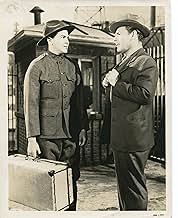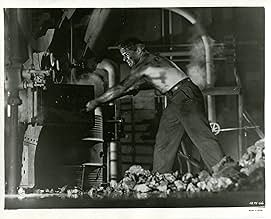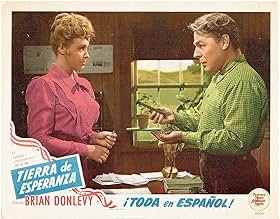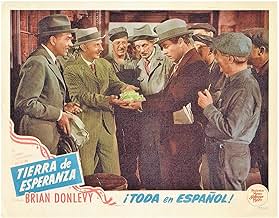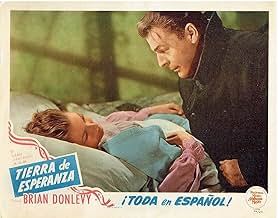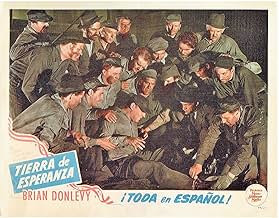Stefan Dangos a immigré en Amérique et a gravi les échelons des mines de fer et des aciéries pour devenir une grande réussite américaine en tant qu'industriel.Stefan Dangos a immigré en Amérique et a gravi les échelons des mines de fer et des aciéries pour devenir une grande réussite américaine en tant qu'industriel.Stefan Dangos a immigré en Amérique et a gravi les échelons des mines de fer et des aciéries pour devenir une grande réussite américaine en tant qu'industriel.
- Prix
- 2 victoires au total
Stephen McNally
- Teddy Roosevelt Dangos
- (as Horace McNally)
- …
Ernie Adams
- Man and Dog Act
- (uncredited)
Fred Aldrich
- Assembly Line Worker
- (uncredited)
Axel Anderson
- Immigrant
- (uncredited)
King Baggot
- Graduation Ceremony Attendee
- (uncredited)
Charles Bates
- Teddy Roosevelt Dangos - Age 8
- (uncredited)
Barbara Bedford
- Hospitable Farm Woman
- (uncredited)
Arthur Belasco
- Drowsy Miner
- (uncredited)
Leon Belasco
- Cigar Store Proprietor
- (uncredited)
Art Berry Sr.
- Customs Man
- (uncredited)
Anna Marie Biggs
- Girl Soprano
- (uncredited)
Avis en vedette
Watching this film tonight and for the first time in about 40 years I also was seeing it in color for the first time and made me even more curious as to why no name stars were in the title roles with such an expensive production. From Robert Osborne I learned tonight that Spencer Tracy was originally going to be Steven Danglos instead of Brian Donlevy. Personally I would have waited for Tracy to become available and not because Donlevy gave a bad performance.
Donlevy's role is that of an Eastern European immigrant who starts work at a steel mill and by dint of his own hard work ethic rises to become a captain of industry. Along the way he woos and weds Ann Richards and they have a girl and four boys. A lot of immigrants did it that way and some are still doing it though many are illegal now. Back when we had virtually unlimited immigration because we wanted to grow the country a lot of stories like Donlevy's were possible although few rose to his heights. On both sides of my family that story could be told modified quite a bit.
In the end Donlevy is confronted with of all things labor management problems. He proves as stubborn as people like Henry Ford in that regard. If you remember in Citizen Kane a drunken Joseph Cotten tells off Orson Welles that something called organized labor is coming on the scene and what you gave your employees as largess is now thought of as their rights. Donlevy has the same paternalistic approach.
American Romance is also a tribute to the power of American industry which was growing to what we thought in 1944 as having unlimited potential. It was the backbone of our war effort and the last ten minutes without words show what Donlevy's Steven Danglos was a part of.
For reasons I think that no name star was in the lead, American Romance did not do that well. That's a pity because it's a fine film with wonderful cinematography which I finally saw on a color TV. Nice casting all around with such familiar folks as Walter Abel, John Qualen, and Stephen McNally. I hope TCM broadcasts it again soon.
Donlevy's role is that of an Eastern European immigrant who starts work at a steel mill and by dint of his own hard work ethic rises to become a captain of industry. Along the way he woos and weds Ann Richards and they have a girl and four boys. A lot of immigrants did it that way and some are still doing it though many are illegal now. Back when we had virtually unlimited immigration because we wanted to grow the country a lot of stories like Donlevy's were possible although few rose to his heights. On both sides of my family that story could be told modified quite a bit.
In the end Donlevy is confronted with of all things labor management problems. He proves as stubborn as people like Henry Ford in that regard. If you remember in Citizen Kane a drunken Joseph Cotten tells off Orson Welles that something called organized labor is coming on the scene and what you gave your employees as largess is now thought of as their rights. Donlevy has the same paternalistic approach.
American Romance is also a tribute to the power of American industry which was growing to what we thought in 1944 as having unlimited potential. It was the backbone of our war effort and the last ten minutes without words show what Donlevy's Steven Danglos was a part of.
For reasons I think that no name star was in the lead, American Romance did not do that well. That's a pity because it's a fine film with wonderful cinematography which I finally saw on a color TV. Nice casting all around with such familiar folks as Walter Abel, John Qualen, and Stephen McNally. I hope TCM broadcasts it again soon.
As A career merchant seaman on the Great Lake's ore carriers, and working for a large steel maker, I found this movie most interesting and well done. This motion picture contains many historical shots of early lake vessels at the locks in Sault Ste. Marie and docking in Gary, Indiana. The story seems to be based on the life of Andrew Carnegie who was also an immigrant from Scotland. My family came from the Pittsburgh area and were employed with a large steel company, so I can relate well to the plot. Brian Donlevey visited aboard some of our vessels while making this movie in the port of Gary, Indiana. I liked this movie and watch it when I find it advertised to be shown on TV. I would own it if I could buy it because of its historical value..
I taped this movie and just got around to watching it. As a senior, I was delighted to watch an old fashioned drama of bygone days and I thought Brian Donlevy did a great job. This man never got the recognition he deserved often cast in unfavorable roles. "An American Romance" gave him the opportunity to excel and he did a great job. I realize it is a Rags to Riches story and from the standpoint of contemporary society, a bit "corny", but it nonetheless had a message that hard work and dedication leads to success and happiness.
My only criticism is that it ended too abruptly. I did not watched the 151 minute version. T.C.M. showed a shorter version but I felt ending with world war II and building planes was a bit of a disappointment.
If you are looking for a film to show your grandchildren, this is it!
My only criticism is that it ended too abruptly. I did not watched the 151 minute version. T.C.M. showed a shorter version but I felt ending with world war II and building planes was a bit of a disappointment.
If you are looking for a film to show your grandchildren, this is it!
I saw this movie as a kid of 10 in Port Arthur, Texas, which had four theaters in a four block area. I don't remember all the details, but it was definitely a feel-good film. The protagonist was an Eastern European immigrant whose name was long and hard to pronounce, so he was re-christened Steve Dangos. Steve first got a job iron ore in an "op'm pit". Being bright and ambitious, he later became an automobile manufacturer and, if the movie is to be believed, was the first to build an enclosed sedan. He was proud to be an American (this was at a point in World War II when the outcome was expected but not guaranteed) and he named his sons after Washington and Theodore Roosevelt. He had his share of sorrow when one of the sons was killed in World War I. This was not one of the all-time film classics, but it must have made a great impression on me for the basic plot to have stayed with me for all these 62 years.
Brian Donlevy stars as an immigrant who comes to America in the late 19th century and rises through hard work to become a success.
This film was written, produced, and directed by the great King Vidor at MGM and was meant to be an American industrial epic culminating in a WW II propaganda piece with bombers flying in formation. It was also supposed to be the story of an immigrant and his family. The film was screened at 150 minutes, and Louis B. Mayer demanded the film cut down to 120 minutes. Vidor has no part in the edit, so what remains is a choppy story with lots of documentary-like scenes of industry. Most of the family story got deleted.
Initially set up at MGM to star Spencer Tracy, Ingrid Bergman, and Joseph Cotten, by the time Vidor was ready to film, Mayer balked at the cost and proceeded with a B cast of Brian Donlevy, Ann Richards, and Walter Abel. John Qualen and Stephen McNally are the only other name actors in the cast.
Saddled with a B cast, Vidor still tried to make the film he envisioned, but there are far too many cost-saving things going on, especially the cheesy sets. While there are some location shots, these are pretty much confined to industrial scenes.
The real pity is that Donlevy gives a terrific performance as does Abel in a much-reduced part. Australian-born Richards, however, is pretty bad, and her accent seems to change in every scene. With the family stuff omitted by Mayer, the narrative is choppy and the "heart" of the film is gone.
It's no surprise that after this bowdlerized version was released in 1944, it was a major flop. MGM lost a bundle and Vidor never worked for the studio again.
This film was written, produced, and directed by the great King Vidor at MGM and was meant to be an American industrial epic culminating in a WW II propaganda piece with bombers flying in formation. It was also supposed to be the story of an immigrant and his family. The film was screened at 150 minutes, and Louis B. Mayer demanded the film cut down to 120 minutes. Vidor has no part in the edit, so what remains is a choppy story with lots of documentary-like scenes of industry. Most of the family story got deleted.
Initially set up at MGM to star Spencer Tracy, Ingrid Bergman, and Joseph Cotten, by the time Vidor was ready to film, Mayer balked at the cost and proceeded with a B cast of Brian Donlevy, Ann Richards, and Walter Abel. John Qualen and Stephen McNally are the only other name actors in the cast.
Saddled with a B cast, Vidor still tried to make the film he envisioned, but there are far too many cost-saving things going on, especially the cheesy sets. While there are some location shots, these are pretty much confined to industrial scenes.
The real pity is that Donlevy gives a terrific performance as does Abel in a much-reduced part. Australian-born Richards, however, is pretty bad, and her accent seems to change in every scene. With the family stuff omitted by Mayer, the narrative is choppy and the "heart" of the film is gone.
It's no surprise that after this bowdlerized version was released in 1944, it was a major flop. MGM lost a bundle and Vidor never worked for the studio again.
Le saviez-vous
- AnecdotesDuring World War II, there were no passenger car assembly lines in operation. As a result, Vidor had to borrow cars from Chrysler, take them apart and re-assemble them in a simulated assembly line. Seen emerging from the factory are 1942 Plymouths with a Danton insignia and hubcaps. These were the last passenger cars manufactured by Chrysler before the World War II shutdown.
- GaffesAs Steve Dangos closes his front door (after arriving home from the board meeting), a hand and lower arm can also be seen closing the door from the outside.
- Autres versionsOriginal version premiered at 151 minutes; later cut to 122 minutes.
- Bandes originalesAmerica, My Country Tis of Thee
(1832) (uncredited)
Music by Lowell Mason, based on the Music by Henry Carey from "God Save the King" (1744)
Played during the opening credits
Reprised at the end
Meilleurs choix
Connectez-vous pour évaluer et surveiller les recommandations personnalisées
Détails
Box-office
- Budget
- 3 000 000 $ US (estimation)
- Durée2 heures 31 minutes
- Rapport de forme
- 1.37 : 1
Contribuer à cette page
Suggérer une modification ou ajouter du contenu manquant

Lacune principale
By what name was An American Romance (1944) officially released in India in English?
Répondre
